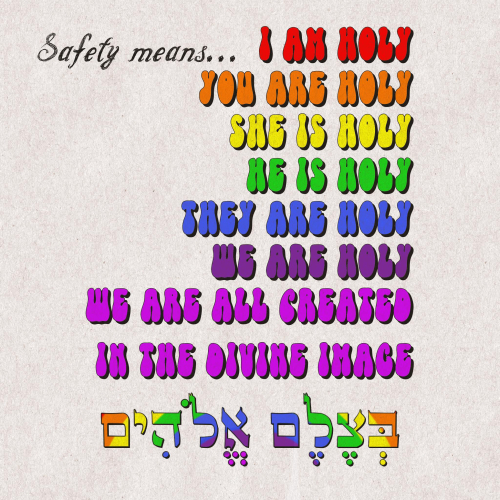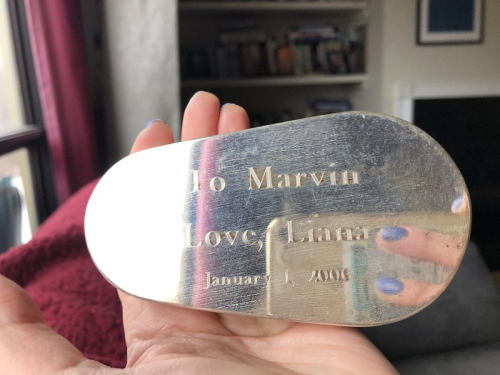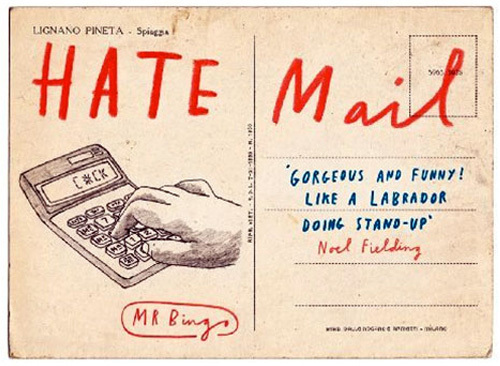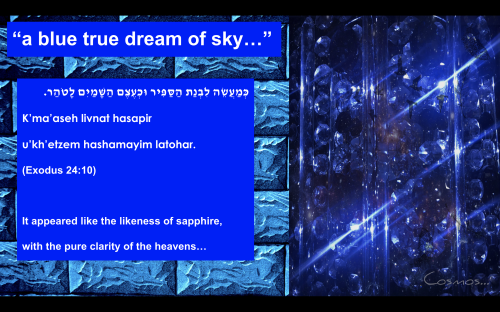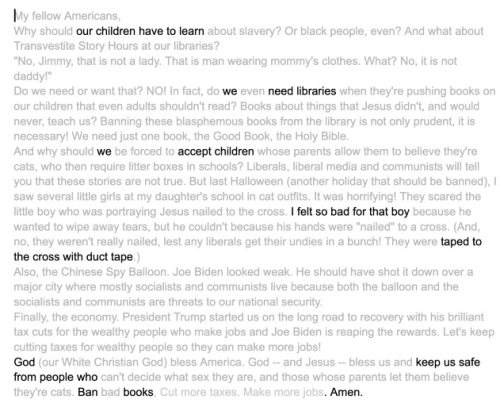Rachel Barenblat's Blog, page 20
March 14, 2023
Not standing idly by
Art by Steve Silbert.
... In Torah���s time we built the mishkan with our own hands, following divine instructions to create something holy. Today we build our systems of ���������� / tzedek (justice) and �������� / tzedakah (righteous giving) when we bring Torah���s ethical blueprints to life. We build a world worthy of God when we refuse to stand idly by as our fellow human beings are harmed. (Lev. 19:16)
Trans and gender-non-conforming people are under threat in the United States. Political violence and eliminationism are on the rise. The anti-trans legislation risk map blares red with alarm. There are nearly 370 bills on the table targeting trans people. I���m a cisgender woman; I���m not at risk. But I owe it to those who are at risk to stand against anti-trans bigotry and harm.
In the days of the mishkan everyone brought what they had. Those who had gold, those who had acacia, those who had blue and purple and crimson yarn ��� they brought whatever they could. Today we each need to bring whatever we can to the table to build a mishkan of safety for trans and gender-non-conforming members of our communities, and all communities...
I was honored to write this week's Torah post for Bayit's Builders Blog. It's part of our ongoing series of essays exploring Torah through the lens of social justice and building a world worthy of the divine. Read the whole post here: A Mishkan of Safety.
(Shared with gratitude to Steve Silbert for the artwork, and to Erin Reed of Erin In The Morning for her reporting.)
March 13, 2023
Ask

be a prayer wheel
be a bicycle, playing cards
tucked between the spokes
reciting endlessly
please God please
tick tick whirr
be the ocean
waves rushing out
and surging in
undertow pulling prayer
to the depths and back
tumbled like glass
be a processor
running a subroutine
of constant yearning
do this for years
all the days
of your life
be an oyster
turning what hurts
into a pearl
March 9, 2023
Old books
These are not our books. But they could be.
Miles of books. Paper bags full of books. Boxes full of books. Loaded one by one into a car and driven away, or in some cases stashed in the cupboard labeled "genizah / for burial." In recent days I've been meeting up with my synagogue board president to sift through the books that had accumulated in our storage room, books that had piled up in every office, books that had been dropped off at the door anonymously like those extra zucchini that get hidden in people's cars or left on their front steps.
It's common, at synagogues. (Churches too, maybe?) We accumulate books the way children accumulate memories. And some of these books are themselves precious memories. And some are useful. But many of ours are now Goodwill-bound. I wonder what the local Goodwill staff must think, sorting this vast and sudden influx of books about Judaism. Books on Jewish history and thought. Books on Israel. Books from the 1950s on the critical challenges facing American Jewry "today."
Old college textbooks from religion classes. (Okay, a few of them were mine. Will I ever again need that textbook on the Protestant Reformation? Probably not.) Hardbound Hebrew-English dictionaries. Old translations of Jewish texts, typeset in tiny print. We also have a full synagogue library packed with books that no one ever borrows, and that's in addition to these stacks of tomes and piles of texts. Someone dies or moves away, and next thing we know another pile of books has sprouted...
Old siddurim and holy books go in the cupboard to be buried in the sanctified ground of our cemetery. Once they are tattered from long use, we treat them with reverence and lay them to rest along with our beloved dead. But the secular books get stacked and bagged, or boxed, and hauled to the car, and taken away. It's hard to let go of books. We're the People of the Book! And yet there are so many books that haven't been touched in years. Books we'd forgotten we had. Books we just don't need.
I like to imagine some Jewish college student, maybe, browsing the bookshelves at Goodwill and exclaiming at some of these finds. I always loved finding Judaica in used-books stores or on the bookshelf at a thrift store. It felt like a little gift from the Universe: I see you. A reminder that Jews have lived in all kinds of places... including the small towns around New England around which my beloved ex and I used to drive, searching for quirky secondhand things like those old church pews.
Now the shul storeroom is manageable. We can find the Pesach dishes, the yarhzeit candles, the box of graggers for Purim. Some of my colleagues are establishing a "no donated books" policy -- all of our shelves overflow. It makes me a little bit sad, but I get it. I hope these books land in the hands of people who want them. And having joined in cleaning out my own parents' possessions after their deaths, I'm aware of how our objects persist, moving through the world long after we are gone.
March 4, 2023
Absence and Presence: Tetzaveh and Shabbat Zachor 5783 / 2023
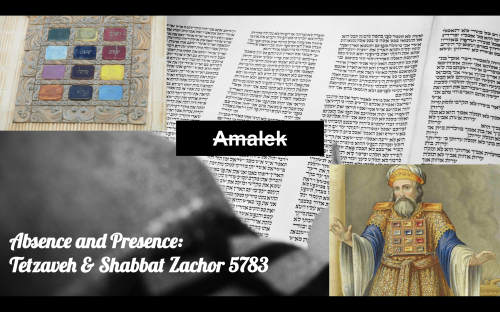
This week's Torah portion, Tetzaveh, contains instructions from God about all kinds of sacrificial practices. Here are instructions on how to anoint Aaron and his sons as priests, how to make their special garments, and how to ordain them. There are instructions for daily offerings, and where to go to hear God's voice (at the entrance to the Tent of Meeting, where community convenes.)
The Hasidic master known as the Kedushat Levi (aka R. Levi Yitzchak of Berditchev, 1740-1809) asks a question common to our sages: why is Moses not mentioned in this parsha? These instructions are given to Moshe, but his name never appears. It doesn't even begin, "And God spoke to Moses, saying..." which is a pretty common frame in this part of Torah. What's up with that?
And his answer is: in order to ordain Aaron and supervise everything in this parsha, Moshe has to serve as High Priest, a role that doesn't exist yet because Aaron will be the first. Kedushat Levi says that when Moshe is filling this role, he engages in what our mystics call bittul. He lets go of ego and makes himself transparent to become a clear channel through which God can flow.
Moshe pours himself into service so thoroughly that he isn't even named in this parsha... and he doesn't need to be. His unnamed presence so profoundly suffuses this story that "he" doesn't need to be "here" at all. We find Moshe in this Torah portion precisely in not-finding-him in this Torah portion. His name is absent, because his presence is so... present. It's almost a kind of koan, isn't it?
Here's another: today is Shabbat Zachor, "the Shabbat of Memory." There's an extra Torah reading for today about how Amalek attacked us as we left Egypt. Amalek attacked from behind, targeting the weak, elders and children -- so Torah instructs us to "blot out" that name. But how do we blot out a name by recounting it? If we're naming Amalek, aren't we thereby remembering?
Here's my best understanding this year. Amalek's name is in Torah. Our people's spiritual history doesn't get erased. Where we've come from and what we've been through are part of who we are. But we're meant to X out this memory, to strikethrough, to repudiate the injustice and harm for which it stands. We remember Amalek even as we aspire not to be defined by traumatic memory.
The name Amalek has come to mean antisemitism personified: no longer a specific person or nation, but the hateful and age-old force of antisemitism itself. It implies all who hate us and want to destroy us. Like Haman -- understood as Amalek's descendant both physically and spiritually -- which is why on Purim we gnash graggers to blot out that name. His name is spoken, and we also X it out.
Speaking of names (Moshe and Amalek, unspoken and spoken) -- in Megillat Esther, God's name never appears. Usually when The Name appears, we substitute Adonai or Hashem or some other word that points toward God's ineffable un-sayable-ness. But in this scroll, it's not that we replace The Name with anything -- God's name isn't even there. A book of Tanakh without God?!
I mean, my answer is no, that's not what this is. Yes, salvation from Haman's plot to exterminate us appears to come entirely via human hands. But remember how R. Levi Yitzchak taught that in this week's parsha Moshe is so present we don't need to name him. I would argue that here God is the same way. God is everywhere in this story, so integral that it goes without saying.
And if divine presence is so woven into the Esther story that it goes without saying, then the same must be true for us in our moment now. Even if antisemitism is on the rise, even if modern life might sometimes feel the opposite of holy, God is not absent. Compassion, and justice, and love are not absent. They're everywhere, if only we have eyes to see them... and hands to do them.
The Kedushat Levi also writes:
Each of us must wipe out that negative part that is called Amalek hidden in their heart... Since each of us is also a small world, when the power of evil in each of us arises (then) Amalek is still in the world.
For him, Amalek becomes an internal force -- that within us which draws us to do the wrong thing, or keeps us from doing the right one. I love that Hasidic move of taking Torah inside, making it about our own hearts. And... we always need to balance the inner work with outward action. We are called to transform and reshape our inner Amalek so that we can act.
Mordechai reminds Esther, "If you don't save our people, someone else will -- but don't imagine that your inaction will save you, and who knows, maybe this was the reason you became queen in the first place!" It's Esther's job to step up and save her people because she's in a position to do it. Our sages call this divine providence: the hidden hand of God at work.
In a month we'll read in the Passover haggadah that each of us is obligated to see ourselves as though we ourselves had been liberated from Egypt. What if each of us could also take on the obligation to see ourselves as if we were Esther? What if we're planted in this place and time precisely so we can do something... and after Shabbes, what will our next action inspired by Esther's bravery be?
Shared with gratitude to the Bayit board of directors for weekly learning together, which this week sparked my d'varling for Shabbat. Cross-posted to the Congregation Beth Israel From the Rabbi blog.
February 27, 2023
Year one
"What did we even do for Purim last year?" I wonder aloud to a friend. It's disconcerting. Purim happens every year. Surely last year I must have celebrated it in some way! But I can't remember a thing. It's as though Purim has been wiped off of my mental map. What could we have done?
"Weren't you in shiva?" he asks, and the memory stops me in my tracks. Of course. That's why I can't remember last Purim: I didn't have one. On Purim I was in the midst of the week of shiva. I was new to being wholly parentless. Talk about topsy-turvy: my world was completely upside-down.
Dad died on the 6th of Adar II (the second Adar that happens in a leap year), right before Purim. As it happens, Mom also died during a Jewish leap year, on the 21st of Adar I. This year's a "normal" one, not a leap year, which makes their yahrzeits feel... not normal, because they've switched places.
On the Gregorian calendar, Mom died in February and Dad died in March. Jewishly, their yahrzeits now orbit around each other. Hers comes first during leap years, which fits the way we experienced it. His will come first during non-leap years. Like this one we're in now. No wonder I feel scrambled.
Dear Dad: what a year it's been. A few days ago I visited your kever. I pressed my palm to the earth and cried. Look how tall your grandson's gotten, I said, as though you can see him more clearly when we're there. I do feel a certain closeness to you and Mom when I'm there, walking where you walked.
One of the things I brought home with me after you died was a silver gragger, engraved from Mom to you and dated January 1, 2000. I wish I could ask y'all about it now. Why a gragger? Why New Year's Day? What was the story? I dreamed of you the other night, but my questions have no answers.
February 23, 2023
Dear Anonymous
Dear Anonymous Stranger Who Called Me A Kapo This Time,
Thank you for inspiring me to write more today! It's never news that someone's wrong on the internet, and I know there isn't any merit in engaging with your note. But you've reminded me of some things that are worth saying about how I understand Torah; what I stand for; and why I think hiding behind an anonymous email account to send hate mail is such a spineless (and self-owning) move.
������������ ������������ �������������������� ���������������� �������������������� �������������������������� ������������������������ ����������������' �������������������� ������������ ����������"Justice, justice shall you pursue, in order that you may live and inherit the land that Adonai your God is giving to you." (Deut. 16:20)
You claim to take issue with how I cite this verse -- often, though not always, quoting the first three words instead of both clauses. Granted, our sages often give us only the first few words of a citation (v'chulei / etc), but I don't think that's really what this is about. I think it's possible you just don't like my understanding of the verse. But maybe I haven't been clear, so let me try again.
Torah teaches that the way to really live (some translations say thrive) is to pursue justice and aim for it with all our might. Without justice, we won't inherit the land. This message found in Torah is echoed by a variety of our classical prophets: if we don't do what's right, the land will spit us out (and, it's implied, we'll deserve it -- because we're supposed to be pursuing and practicing justice.)
"Tzedek tzedk tirdof" applies no matter where we live. In every place where Jews make our homes, we're called to pursue justice, in order that we may live up to our end of the covenant we've made with God. Also because doing justice is what's right. Today this verse also speaks to me of the need for environmental justice, lest the planet become so inhospitable that none of us can survive.1
I'm getting off track. Dear sir -- I'm assuming you're a sir, based on past experience -- I do object to your emailing me photographs of desecrated Jewish bodies tumbled into mass graves.The memories of those souls, the memories of all six million, deserve better. You also included photographs of Hamas and Hitler, I think trying to imply that support for Palestinians' human rights makes me a Nazi?
I don't write much about Israel and Palestine these days. I don't feel that my voice adds anything to the conversation. I'd rather focus on co-creating liturgy with my Bayit hevre, reflecting on what might be helpful to others out of the grief journey of mourning my parents, and writing divrei Torah that speak to all whom I serve during these times of injustice, climate crisis, and rumbles of civil unrest.
But I do share my writing online under my real name, and my contact information is easy to find. Whether I'm writing about aspirations toward justice or the spiritual journey of burying a loved one, I attach my name to my words. (Which is why people like you can send hate mail calling me a kapo and accusing me of colluding with Nazis.) I notice your email to me is completely anonymous.
It seems that you don't want to be held accountable for your words. Apparently you want to be hateful without repercussions, which suggests perhaps some insecurity about the stance you're taking. But more than that, hiding behind anonymity to send hate mail reveals cowardice and a profound lack of dan l'chaf z'chut / giving the benefit of the doubt. Go do some mussar work, friend.
"When people show you who they are, believe them," as the saying goes. I don't know who you are, but your choice to send anonymous hate mail tells me a lot about who you've chosen to be. The best response I know is to speak more, write more, and stand up more for all who are marginalized. Thanks for reminding me to double down on becoming the justice-seeker I aspire to be.
Image from Mr. Bingo's "hate mail project," which pokes fun at the very notion of hate mail.
1. As Talmud reminds us, God's words are multivalent. Torah contains an infinity of meaning for us to unearth as we evolve and grow. Like my friend and teacher R. Mike Moskowitz teaches, our task is uncovering and discovering what was already there -- this applies whether we're talking about trans issues in Torah, or inviting Torah's wisdom to drive our work toward climate justice. (Relatedly, allow me to recommend R. Danya Ruttenberg's post Jews for Exegesis.) This is how we participate in revelation's continuing flow.���
February 17, 2023
(Reproductive) Justice and the dream of sky: Mishpatim 5783 / 2023
This week's Torah portion, Mishpatim, is full of justice-related mitzvot. Like: if you dig a pit and you don't cover it, and somebody's animal falls in and dies, you���re responsible because your negligence caused its death. And: do not wrong or oppress the stranger. And:
"When parties fight, and one of them pushes a pregnant woman and a miscarriage results, but no other damage ensues, the one responsible shall be fined according as the woman���s husband may exact, the payment to be based on reckoning." (Ex. 21:22)
Let���s unpack this. If someone causes a miscarriage, they owe damages. Damages, not "they get sent to a city of refuge." Elsewhere Torah teaches that in order to stop the cycle of retaliatory violence, we are to establish cities of refuge, where someone who has unintentionally committed murder can go and not be subject to blood revenge. But that���s not mentioned here, only the payment of a fine. Ergo, in Torah���s view, causing a pregnancy to end is neither manslaughter nor murder.
Torah is the beginning of the conversation, not the end. So where does our tradition take this? Mishna (c. 200) teaches that in the case of a difficult labor where the pregnant person's life is at risk, do what we would now call a D&C. In the Talmud (c. 600), R. Yehuda HaNasi holds that a fetus is considered as a limb or an organ in the pregnant person's body until it draws first breath.
Mainstream Judaism has long taught that if there is danger to the pregnant person's life, abortion is not only permitted but required. This is often rooted in teachings about a rodef, a pursuer who would cause harm. If the fetus would cause harm, we privilege the life of the pregnant person, again until first breath. R. Eliezer Waldenberg (d. 2006) argues that abortion is permitted even if the danger is "only" emotional distress or harm.
Our religious worldview is entirely different from the one that has criminalized not only abortion, in half of this country, but now even miscarriage. According to their understanding of their religion, a zygote has the same rights as the person in whose womb it is carried. It's not my job as a rabbi to have opinions about when some Christians think "life begins." But it is my job to be clear about three things.
Judaism teaches otherwise. (See this week's Torah portion.)
Torah also teaches not to wrong or oppress the stranger. (Again, see this week's Torah portion.) Forcing someone to carry a pregnancy is a profound wrong.
No one should be able to impose their theology on anyone else's body.
Granted, NPR reports that more than half of Republicans nationwide believe that this should be a Christian nation. I���m not thrilled that a majority of one of our major political parties would prefer that our nation be a theocracy. But this is where we are.
Massachusetts feels fairly safe. Our rights are protected by our state laws... unless the federal government enacts a nationwide ban on reproductive healthcare. (Which the religious right hopes to do.) But even if we feel safe here and now, Torah instructs us to concern ourselves with the needs of the widow and the orphan and the stranger -- in Torah's paradigm, the people with the least cultural capital and the least power.
In our day, that could mean asylum-seekers, refugees, people who are trans or gender-non-conforming. Black and indigenous people of color. People living in poverty. People living in prison. People living in forced-birth states, who don't have the means to take time off to travel to another state where their right to their own body is still intact. (Also the Christian right may be trying to make that illegal too.)
Right after SCOTUS gutted Roe, I saw a lot of people posting on Facebook that if anyone needed to "vacation" in Massachusetts, they would open their homes. ���Come on up, stay with me, I'll drive you to... wherever you need to go ...and offer you a hot water bottle and some tea afterwards.��� Come "vacation" in a free state! Wink, wink.
It was a clear expression of care. And, I think, of rage at the Supreme Court and at our own impotence. It was also basically useless. What are the odds that someone in a forced-birth state would ever see (or trust) a FB post from someone they didn't know?
You���ve all heard me quote Mariame Kaba���s wisdom that ���hope is a discipline.��� She also reminds us not to reinvent the wheel when it comes to working toward justice. Better to channel our energy and resources toward people who are already doing the work.
So maybe instead of offering a guest room on Facebook, we can donate to the National Council of Jewish Women, who maintain a Jewish Fund for Abortion Access. Or: support the American Civil Liberties Union, which is challenging abortion restrictions in courthouses and state legislatures across the country.
Or donate to Sistersong, the Black organization that coined the term ���reproductive justice:��� the human right to maintain personal bodily autonomy, have children, not have children, and parent the children we have in safe and sustainable communities.��� Sistersong is the largest national multi-ethnic Reproductive Justice collective.
Reproductive justice is a much broader framework than simply ���the right to choose,��� or even the right to choose plus access to safe reliable healthcare. It���s about everything: access to food, affordable shelter, education, ending carceral foster care, ending gun violence, and more. All of these are part of what it would really look like to rear children in a just world.
And we can take heart that the majority of Americans do agree that bodily autonomy is a core human right. In 2022, voters in Kansas overwhelmingly opposed a constitutional amendment that would have removed that state's protection of a pregnant person's fundamental right to autonomy. That took a lot of on-the-ground effort: knocking on doors, fighting misinformation, and one-on-one conversations. But that���s what works.
In our ancestral story, after leaving Egypt we spent forty years wandering in the wilderness. There were plenty of setbacks, and some people wanted to turn back. But we made it to Sinai, to covenant and revelation. These post-Roe years may feel like wilderness, but we can't give up. We have to keep trying to build a world of greater justice. We owe that to future generations, and to those who have it worse than we do.
Also in this week's Torah portion, there���s the verse we've been singing this evening. This is the scene where Moses and Aaron and seventy elders ascend to heaven and behold "the God of Israel -- under whose feet was the likeness of sapphire brickwork, like the very sky for purity." (Ex. 24:10) And they eat and drink at a banquet with God.
From the mundane to the sublime. Here's what to do if your ox gores somebody, and here's a vision of the Holy One of Blessing across a floor of sapphire sky. This juxtaposition teaches that the loftiest moments of our spiritual lives are not separate from the earthly details of ethical living. They can't be. "Spiritual life" that doesn't ask our ethical behavior is meaningless.
In that vision our ancestors saw something like "sapphire brickwork" -- perhaps a reminder of the bricks we slaved to build under Pharaoh's oppressive regime. But now the "bricks" are the blue of the sky itself: infinite, open, free. We���ve gone from the compression of mud to brick, to the sky's wide-open expanse. What a beautiful metaphor for the journey from oppression to liberation, from rights stripped away to human dignity wholly honored. May we build that world speedily and soon.
I���ll close with words from poet Aurora Levin Morales:
V���ahavta
when you go out and when you return. In times of mourning
and in times of joy. Inscribe them on your doorposts,
embroider them on your garments, tattoo them on your shoulders,
teach them to your children, your neighbors, your enemies,
recite them in your sleep, here in the cruel shadow of empire:
Another world is possible...
[I]magine winning. This is your sacred task.
This is your power. Imagine
every detail of winning, the exact smell of the summer streets
in which no one has been shot, the muscles you have never
unclenched from worry, gone soft as newborn skin,
the sparkling taste of food when we know
that no one on earth is hungry, that the beggars are fed,
that the old man under the bridge and the woman
wrapping herself in thin sheets in the back seat of a car,
and the children who suck on stones,
nest under a flock of roofs that keep multiplying their shelter.
Lean with all your being towards that day
when the poor of the world shake down a rain of good fortune
out of the heavy clouds, and justice rolls down like waters...
Imagine rape is unimaginable. Imagine war is a scarcely credible rumor.
That the crimes of our age, the grotesque inhumanities of greed,
the sheer and astounding shamelessness of it, the vast fortunes
made by stealing lives, the horrible normalcy it came to have,
is unimaginable to our heirs, the generations of the free.
Don���t waver. Don���t let despair sink its sharp teeth
Into the throat with which you sing. Escalate your dreams.
Make them burn so fiercely that you can follow them down
any dark alleyway of history and not lose your way...
Hold hands. Share water. Keep imagining.
So that we, and the children of our children���s children
may live
Aurora Levins Morales
This is the d'var I offered at Kabbalat Shabbat services at Congregation Beth Israel of the Berkshires (cross-posted to my From the Rabbi blog.)
Shared with gratitude to the NCJW for their collection of reproductive justice resources, and also to my advance readers for sermon suggestions.
Music, music, music
Every night
I tuck my teen in bed
and close his door, humming
the lullaby you used to sing.
Most kids of his generation
don't know "A Bushel
and a Peck." 1950:
you were glamorous,
flirting with the bugler
you would later marry.
I don't think he remembers
"put another nickel in,
in the nickelodeon,"
though you sang it
when he was swaddled
in velcro-edged blankets.
Another top hit
from when you were fourteen,
the age he's
barreling toward
now.
Songs that didn't make it into this draft of this poem include "Sisters, Sisters" (White Christmas, 1954 -- the year my parents married), "Annie Mae, Where Are You Going," (origins unknown, though I suspect it's a camp song from the late 40s or early 50s), and "The Billboard Song" which exists in many folk versions, though of course I'm attached to the one Mom used to sing. Sometimes I wonder which songs from my son's childhood -- or, perhaps, from mine -- will delight and comfort him in the (hopefully distant) future when I'm gone.
February 9, 2023
From a distance
In the photograph attached to the email that I just got, they're both in the living room. Sitting comfortably, talking with family. It's an action shot, not a candid, which makes it seem all the more real. I can hear their voices. They could be right there! I know they're not. But I wish they were.
One of the things I never anticipated about mourning my parents is the role distance would play. I've lived two thousand miles away from them since I was seventeen. (I'm going on forty-eight.) Most of the time, in my adult life, their presence was at a distance. And that was fine. It was normal.
It was comforting, knowing they were there. I knew that when I got off the plane, one of them would be in the cellphone parking lot awaiting my call. I knew that their living room would still be just as it had been, and so would the pad of paper in the kitchen awaiting grocery lists...
It was comforting, knowing that some things never change. Except of course they do.
Someone else inhabits that house now. Treasures become trash: the clothes we didn't take went to Goodwill, the books sold to a used books store by the pound. I've had moments of wondering: what is it all for? With or without illness, life ends, and what's left can feel so small.
That's a whole mood, as the kids say. It's become a familiar one, these last few years. It's also grief talking. I don't feel it as often as I did a year ago, but it's not gone. Letting myself feel grief, while still holding on to my certainty that love and care matter even if we're temporary -- that's the work.
On the Jewish calendar it's not yet Adar (aka parental yahrzeit season). But on the secular calendar we're approaching February vacation week. In 2019, we spent that week saying goodbye to Mom. In 2022, we spent it saying goodbye to Dad. Each time, they died a few days after we visited.
We're returning to Texas for a few days in February. It will be my first time back that's not for a funeral. From here it's easy to slip into feeling like they could still be alive, just far away. But that fiction won't hold when I arrive in a Texas where they will no longer be there to greet me.
February 8, 2023
Children
our children have to learn
we need libraries
we accept children
I felt so bad for that boy
taped to the cross with
duct tape
God
keep us safe from people
whose parents ban books
Amen.
I am new to the art of erasure poems (and am deeply inspired by Dave Bonta's erasure poems -- here's a recent one that's particularly excellent.) But I found myself struggling for words this morning.
Language itself becomes debased, meaning comes unmoored, when people repeatedly insist on things that are not true. This form felt right today. It's my attempt to make meaning out of gibberish.
(The original text claims to be Sarah Huckabee's "rebuttal" from last night. If you want to read her words, you can easily find a transcript of what she had to say. I won't reprint her words here.)
While I'm here: trans rights are human rights, gender affirming care saves lives, banning books is grotesque, and God is a far vaster reality than what any single religious tradition might claim.
Updated to add: Thank you to the reader who let me know that I've been hornswoggled -- this is not in fact the text of her rebuttal, it's satire. The fact that I couldn't tell satire from reality does say something about the world we're living in, and about the degradation of truth in an era of misinformation, and about how easy it is to get caught up in the digital outrage machine. I've been reading on Twitter about horrendous anti-trans bills in Missouri and elsewhere, and the ugly rhetoric and triumphalist theology that underpins those, and I was all too ready to take this satire as fact. I should have better media literacy than that -- I should have searched for a corroborating source before getting so angry. I apologize.
Then again, I do like the poem I came up with, so there's that.
Rachel Barenblat's Blog
- Rachel Barenblat's profile
- 6 followers


